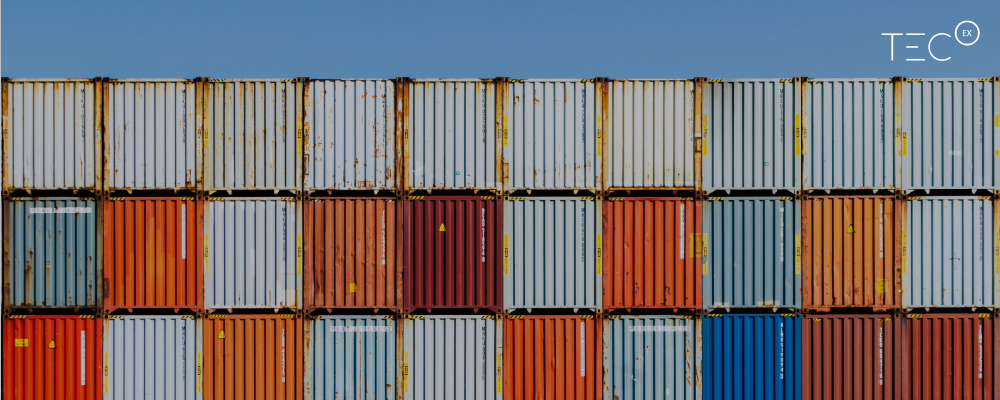Global shipping is a cornerstone of globalization and the spread of innovative technology, allowing new tech to travel faster and further across the globe as it evolves. The Han Dynasty’s invention of paper in AD 105 took 1000 years to spread to Europe. Today, it’s unimaginable for a groundbreaking invention to take more than a few weeks to go global.
While global shipping is key to the worldwide flow of knowledge and innovation that boosts economic development domestically and internationally, it faces extensive risks and potential issues.
Key Challenges Of Global Shipping
The challenges of global shipping can be overwhelming. Navigating stringent requirements and international events to prevent shipping delays and keep your shipment moving requires an in-depth understanding of global trade. Working with an expert like TecEx can ensure smooth sailing for your global shipping while you focus on innovating your tech and nurturing your customers.
Global Shipping Delays and Supply Chain Disruptions
Successful global shipping requires streamlined global logistics and efficient supply chain management.
Global logistics requires reliable resource acquisition, inventory management, proper storage of goods, and the smooth flow of goods from businesses to consumers. Tech logistics are challenging to navigate when the goods are high-value or dual-use.
Supply chain management involves the entire process, from acquiring raw materials to fulfilling customer orders. SCM is vital for tech companies to ensure regulatory compliance, avoid customs delays, and create supply chain visibility.
In addition, supply chain risk management is vital to identifying and mitigating risks, reducing costs, optimizing the supply chain, and lowering the likelihood of delays and disruptions. From natural disasters and conflicts to bankrupt suppliers or unexpected consumer demands, successful global shipping needs contingency plans and solutions to face these risks.
Stuck Shipments
A shipper’s worst nightmare is a stuck shipment.
The high costs and delays are a real headache, whether caused by missing or incomplete documents like a certificate of origin, inaccurate descriptions using HS classifications and ECCN codes, or missing invoices.
Global Trade Compliance
Global shipping requires complex documentation, as shipments must comply with changing regulations and standards from different countries. Import or export licenses and permits must be acquired, and tariffs and duties must be paid.
Understanding what documentation you need at what point in the shipping process is integral to efficient global shipping. Clearing customs requires several documents, with the 5 most common import documents being:
- A Commercial Invoice as a proof of sale for the transaction between the buyer and seller,
- A Bill of Lading for sea freight or an Air Way Bill for air freight to provide further details about a shipment,
- A Packing List to itemize the contents of each package and streamline customs clearance,
- A Certificate of Origin to verify where the goods were produced, manufactured, or processed, which ensures they can legally enter a country and may reduce duties, and
- Any import permits and licenses required by the destination you are importing into.
Don’t be overwhelmed by the pressure of preparing shipping documents. Contact a TecEx expert to ensure you have all the necessary documents for smooth global shipping.
Trade Sanctions
The current sanctions in place are extensive and challenging to navigate. Compliant global shipping requires shippers to carry out frequent sanctions reviews. This also emphasizes the need for clear communication between all parties in a global shipment to ensure compliance, as not all countries are subject to the same sanctions.
The current sanctions in place from the US (view their sanctions programs here), the EU (see their sanctions map here), and the UK (read their sanctions list here) cover countries from Afghanistan to Zimbabwe. Below are some countries that are heavily sanctioned:
Russia
Sanctions against Russia are frequently increasing and lengthening. The US, EU, and UK have placed extensive sanctions on Russia, from state-owned companies to individuals and private entities.
The US has placed significant sanctions on Russia. This includes banning Russian vessels from US ports, restricting transactions with Russia’s central bank, and imposing export controls against quantum computing, technology, defence, aerospace, and maritime sectors.
North Korea
Sanctions against North Korea are broad. As well as various minerals, food items, fuel, luxury goods, and aviation items, the US, EU, and UK have banned direct and indirect sales and transfers of dual-use goods and technology that could contribute to weapons of mass destruction to North Korea.
The US Department of Treasury has warned of North Korea’s deceptive shipping practices, such as falsifying shipping documents or concealing the origin or destination country, in an attempt to evade sanctions.
Iran
The EU and UK sanctions on Iran are focused on military and nuclear goods and technology, amongst other items. The US, EU, and UK all have sanctions on items capable of monitoring and intercepting communications. These sanctions make performing any transactions with or imports into Iran extremely challenging.
Syria
The US, UK, and EU have a range of sanctions on Syria in protest of the Assad regime. Syria-related payments cannot be processed through US banks or US dollars. The EU and UK also prohibit selling, supplying, and transferring various dual-use items. The US sanctions prohibit most trade of goods and services between US citizens and the Syrian government.
Venezuela
Venezuela faces several sanctions – from specific individuals and entities to US and non-US citizens who have assisted the Government of Venezuela with material, financial, or technological support.
The US has also banned US banks and shipowners from transactions involving the “Petro,” a Venezuelan cryptocurrency. EU and UK sanctions are more limited to equipment, tech, or software that can be used to monitor and intercept communications.
Cuba
While the UK and EU have no sanctions on Cuba, the US has several sanctions and a trade embargo in place.
- The 180-day rule
Ship owners globally are prohibited from entering US ports to load or unload freight for 180 days after entering Cuba to trade goods. The only exemptions are OFAC authorization, or if the items carried to Cuba would be classified as EAR99, if subject to the EAR, or would be controlled on the Commerce Control List (CCL). - The 10% De Minimus Rule
This shipping restriction is on exporting and re-exporting goods with over 10% US-origin content. A license is required to re-export foreign-made items with more than 10% US-origin content to Cuba. - U-Turn Transactions
U-Turn transactions indirectly involve Cuba and are processed through the US financial system. As of May 2024, US banks can process funds that involve Cuba, but these transactions may not involve US dollars.
Export controls
A 2021 survey by KPMG found that 99% of the export compliance programs of over 100 multinational firms are affected by US export controls, despite 95% of the globe’s consumer base being outside the US.
Companies need to conduct export control risk assessments based on all external touchpoints and their specific business profile and activities. This includes the entire product lifecycle, the customer lifecycle, sales and order fulfillment, shipping, delivery, and returns. US export controls on AI chips to China show the extensive ripple effect of shipping restrictions on high tech.
Did You Know?
The Australia Group (AG), consisting of 43 countries, was founded in 1985 in response to the use of chemical weapons in the Iran-Iraq war. To prevent the proliferation of such weapons, the participating countries enforce export controls on the chemicals, biological agents, and dual-use equipment, technology, and software that could be used to manufacture or dispose of these weapons.
Shipping Restrictions
Shipping restrictions vary from one country to another. It’s pertinent to distinguish between prohibited items and restricted ones. Prohibited items are strictly forbidden from crossing international borders, while restricted items may face various regulations imposed by a government to protect its country from specific threats.
Lithium batteries are an example of an item that commonly faces shipping restrictions. As they are considered hazardous materials (HAZMAT), lithium battery shipments require strict precautions, proper packaging, specific labeling, and lengthy documentation. Learn more about safely shipping lithium batteries here.
Are you intimidated by the pressure of complying with ever-changing and highly complex sanctions, export controls, and shipping restrictions? TecEx has the extensive knowledge to navigate these obstacles safely.
Technology For Global Shipping Tracking
A key to successful global shipments is global shipping tracking with advanced technology. The TecEx App enables seamless global shipping tracking for improved supply chain visibility. With our App, you’ll have the information to foresee delays, assess risks, and avoid extra costs.
Knowing when your shipment should arrive and where it is at any given time allows better shipment management to prevent demurrage and detention costs.
The TecEx App will enable you to add third-party suppliers to follow the global shipping tracking, which assists all parties in fulfilling their responsibilities as stipulated by the shipment’s Incoterms on time.
The TecEx App also allows you to request a quote with minimal information. Our accurate costings with duties calculations will help you prepare for successful global shipping with no hidden costs. Request access to the app to get started.

Navigate Global Shipping Restrictions With TecEx
The risks of global shipping are vast and intimidating. With our knowledgeable experts and track record of seamless customs clearance, TecEx can help you sail smoothly through the rough seas of global shipping to get your goods into over 200 destinations.
FAQs
What Are The Benefits Of Global Shipping?
Global shipping opens up new markets, allowing businesses to reach a wider audience and providing customers with access to products that may not be available locally. The spread of technology also leads to domestic and international advancements and healthy competition.
Why Is My International Shipping Taking So Long?
Delays in international shipping can occur due to various factors, including customs clearance, weather conditions, or logistical issues. Global shipping tracking is vital to knowing where your shipment is and when it will arrive.
Can You Ship Technology Internationally?
Yes, you can ship technology internationally, but you must be aware of regulations. Many countries restrict certain tech goods, so check the destination country’s import rules before shipping.
Will I Have To Pay Customs Duties Or Taxes?
Yes, when shipping internationally, customs duties and taxes may apply depending on the destination country’s regulations. TecEx can assist with our extensive knowledge of duties, taxes, and VAT reclaim.
What Documents Do I Need For Global Shipping?
Customs documentation commonly includes a commercial invoice, certificate of origin, packing list, airway bill or bill of lading, and any permits required for specific items and countries. All paperwork needs to be accurate and complete to avoid delays at customs.
Does TecEx Have Global Shipping Tracking?
Yes, TecEx offers end-to-end shipment visibility. Visit our shipment tracker page here to track your shipment’s journey.






